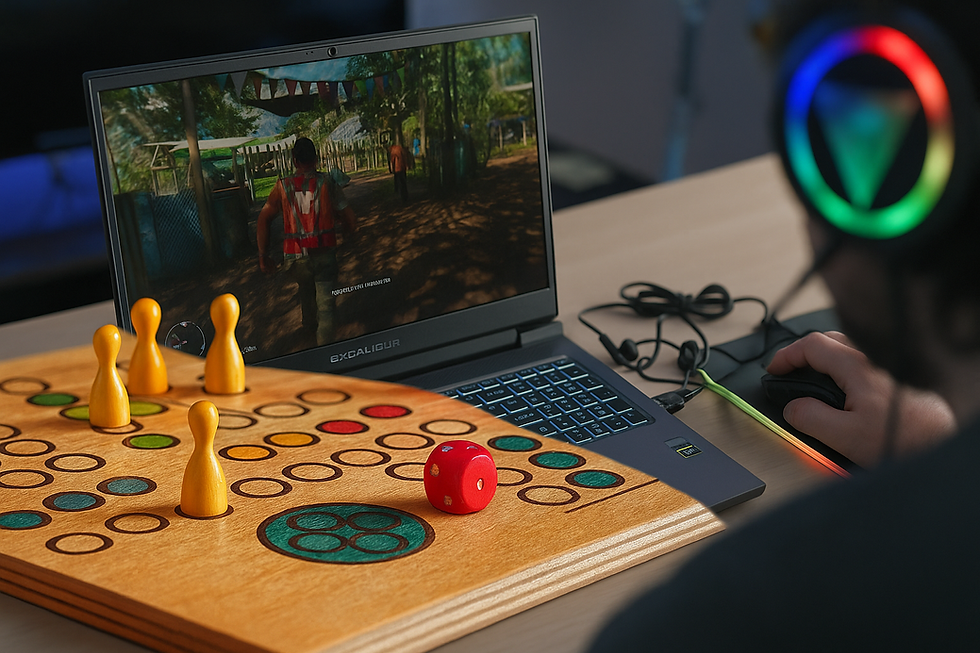Why Cooperative Board Games Are More Than Just Fun
- shahmeerarshad008
- Aug 26
- 4 min read
Table of Contents
Introduction
For centuries, board games have been about competition—racing to win, outsmarting opponents, and claiming victory. But in recent decades, a new type of game has grown in popularity: cooperative board games. Unlike traditional games where you compete against others, these games invite everyone to work together toward a common goal.
From fighting off global pandemics in Pandemic to preventing floods in Forbidden Island, cooperative games create shared stories, test group dynamics, and teach players valuable life lessons. And the best part? They’re more than just fun—they help sharpen essential skills like communication, teamwork, and problem-solving.
What Are Cooperative Board Games?
Cooperative board games are games where players unite against the game system itself, not each other. Instead of battling friends, you all face a shared challenge—whether that’s saving the world, solving a mystery, or escaping danger.
This type of gameplay shifts the focus from winning individually to achieving success as a group, making it an entirely different experience from games like Chess or Checkers, which emphasize individual strategy.
The Psychology Behind Playing Together
Why are cooperative games so impactful? The answer lies in human psychology.
When players work together, they experience:
A sense of shared responsibility.
An increase in social bonding through collaboration.
Positive reinforcement, since victories are celebrated as a group.
Psychologists suggest that collaborative play reduces stress and builds stronger connections compared to competitive play. This explains why families, educators, and therapists increasingly use cooperative board games to encourage empathy, patience, and teamwork.
Cooperative Board Games vs. Competitive Board Games
Most people are used to competitive games like Chess or Go, where one player outsmarts another. These games sharpen strategic thinking, but they also highlight rivalry.
In contrast, cooperative games:
Focus on “we win or lose together.”
Reduce arguments among children, since no one is singled out as a “loser.”
Build an environment of shared learning rather than one-upmanship.
This doesn’t mean competitive games are bad—they’re amazing for developing focus and strategic planning (we’ve discussed this in detail in our Go vs Chess article). But cooperative games fill a different psychological and educational role.

Key Benefits of Cooperative Board Games
Building Communication Skills
To succeed, players must discuss strategies openly. Whether it’s deciding the next move in Pandemic or coordinating in Hanabi, cooperative games encourage clear and respectful communication.
Enhancing Problem-Solving Abilities
Many games present complex challenges, such as managing resources or predicting risks. Solving them together sharpens critical thinking and collective problem-solving skills.
Strengthening Emotional Intelligence
Players learn to handle frustration, share victories, and support teammates who make mistakes—skills tied directly to emotional intelligence.
Reducing Stress and Promoting Relaxation
Unlike high-pressure competitive games, cooperative play feels more relaxed and stress-free. The focus is on working together, not beating each other. This makes them excellent for mental health benefits (similar to insights we explored in board games for mental health).
Encouraging Teamwork and Social Bonding
Families, friends, and even coworkers use cooperative games as team-building tools. The act of relying on each other builds trust, strengthens bonds, and creates lasting memories.
Popular Cooperative Board Games You Should Try
Pandemic
One of the most famous cooperative games, where players are disease specialists racing to stop outbreaks worldwide.
Forbidden Island
A family-friendly adventure where players collect treasures while escaping a sinking island.
Hanabi
A clever card game about building fireworks displays—without seeing your own cards!
The Crew: Mission Deep Sea
A modern cooperative trick-taking game where players complete space missions together.
Why Kids and Families Love Cooperative Games
Parents often find that cooperative board games reduce conflicts at home. Instead of arguments over who won, the focus is on celebrating teamwork. These games also enhance children’s patience, listening skills, and creativity, making them powerful educational tools.
In fact, many schools have started using educational cooperative board games to strengthen student collaboration and problem-solving in the classroom.
The Future of Cooperative Board Games in the Digital Age
With technology evolving, cooperative play is moving beyond physical boards. Digital cooperative board games allow players to connect from different parts of the world and still experience the same sense of teamwork.
Platforms like Pixply are making this possible, offering classic games and modern cooperative ones in a single digital space. Imagine being able to play Ludo, Go, Checkers, or even cooperative-style adaptations—all in one rollable digital board.
This shift ensures that cooperative play remains accessible, inclusive, and exciting in the modern era.
Conclusion: More Than Just Fun
Cooperative board games aren’t just a way to pass the time—they’re tools for building communication, reducing stress, and strengthening social bonds. Unlike competitive games that divide players into winners and losers, cooperative play ensures that everyone contributes and everyone celebrates.
Whether you’re playing classics like Hanabi or discovering new experiences through digital platforms like Pixply, cooperative board games remind us that sometimes the best victories are the ones we achieve together.



Comments